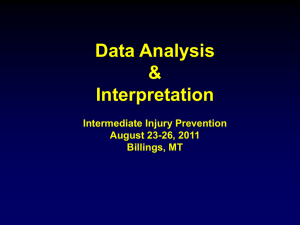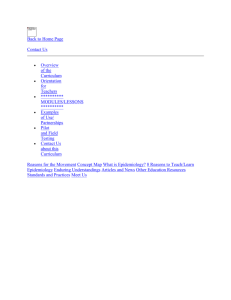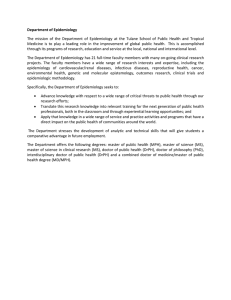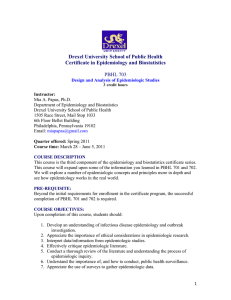Principles of Epidemiology (HS 261)
advertisement
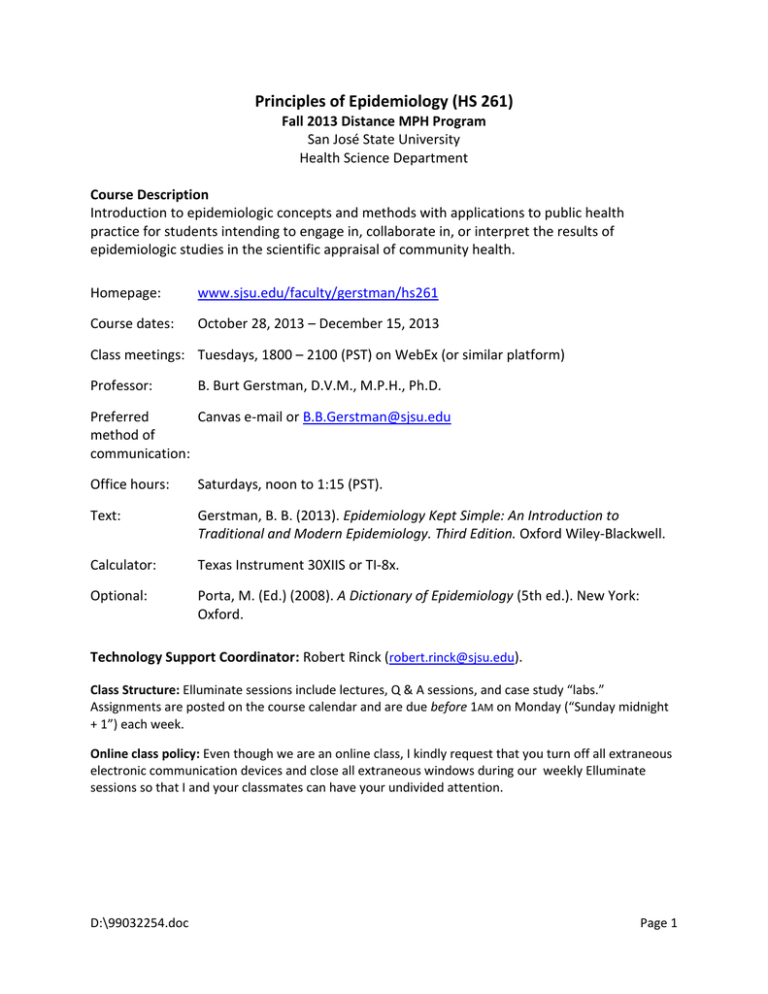
Principles of Epidemiology (HS 261) Fall 2013 Distance MPH Program San José State University Health Science Department Course Description Introduction to epidemiologic concepts and methods with applications to public health practice for students intending to engage in, collaborate in, or interpret the results of epidemiologic studies in the scientific appraisal of community health. Homepage: www.sjsu.edu/faculty/gerstman/hs261 Course dates: October 28, 2013 – December 15, 2013 Class meetings: Tuesdays, 1800 – 2100 (PST) on WebEx (or similar platform) Professor: B. Burt Gerstman, D.V.M., M.P.H., Ph.D. Preferred Canvas e-mail or B.B.Gerstman@sjsu.edu method of communication: Office hours: Saturdays, noon to 1:15 (PST). Text: Gerstman, B. B. (2013). Epidemiology Kept Simple: An Introduction to Traditional and Modern Epidemiology. Third Edition. Oxford Wiley-Blackwell. Calculator: Texas Instrument 30XIIS or TI-8x. Optional: Porta, M. (Ed.) (2008). A Dictionary of Epidemiology (5th ed.). New York: Oxford. Technology Support Coordinator: Robert Rinck (robert.rinck@sjsu.edu). Class Structure: Elluminate sessions include lectures, Q & A sessions, and case study “labs.” Assignments are posted on the course calendar and are due before 1AM on Monday (“Sunday midnight + 1”) each week. Online class policy: Even though we are an online class, I kindly request that you turn off all extraneous electronic communication devices and close all extraneous windows during our weekly Elluminate sessions so that I and your classmates can have your undivided attention. D:\99032254.doc Page 1 American Schools of Public Heath Education Committee MPH Epidemiology Competencies1 Epidemiology is the study of patterns of disease and injury in human populations and the application of this study to the control of health problems. Upon graduation a student with an MPH should be able to: 1. Explain the importance of epidemiology for informing scientific, ethical, economic and political discussions of health issues. 2. Describe a public health problem in terms of magnitude, person, time, and place. 3. Apply the basic terminology and definitions of epidemiology. 4. Identify key sources of data for epidemiologic purposes. 5. Calculate basic epidemiology measures. 6. Evaluate the strengths and limitations of epidemiologic reports. 7. Draw appropriate inferences from epidemiologic data. 8. Communicate epidemiologic information to lay and professional audiences. 9. Comprehend basic ethical and legal principles pertaining to the collection, maintenance, use and dissemination of epidemiologic data. 10. Identify the principles and limitations of public health screening programs. CEPH Accreditation Objectives The following essential objectives meet CEPH accreditation expectations: 1. To explain the importance of epidemiology for informing scientific, ethical, economic and political discussion of health problems. 2. To define basic epidemiologic terms. 3. To describe disease occurrence using principals of descriptive epidemiology. 4. To understand and apply epidemiologic principals of prevention. 5. To apply epidemiologic principles of screening for disease. 6. To calculate and interpret basic epidemiologic measures of disease frequency, measures of association, and measures of potential impact. 7. To draw appropriate inferences from epidemiologic studies of risk (trials, cross-sectional and ecological studies, cohort studies, and case-control studies). 8. To comprehend ethical principals involved in the study of human subjects. 9. To assess systematic errors in epidemiologic research. 10. To communicate epidemiologic information to lay and professional audiences. Grades: Grades are based on a weighted average of HW assignments and quizzes (35%), and exams (65%). The midterm occurs after week 3 of the session and includes content from Chapters 1 – 5. The final occurs at the end of week 7 and includes content from Chapters 5 – 10. Letter grade assignments are based on the weighted average of your scores with these thresholds: 100-97% 96-93% 92-90% A+ A A− 89-87% 86-83% 82-80% B+ B B− 79-77% 76-73% 72-70% C+ C C− 69-67% 66-63% 62-60% D+ D D− Below 60% F University Drop Policy: Unsatisfactory performance in coursework is not considered a serious and compelling reason in itself for requesting permission to drop. Students are responsible for 1 Calhoun, J. G., Ramiah, K., Weist, E. M., & Shortell, S. M. (2008). Development of a core competency model for the master of public health degree. American Journal of Public Health, 98(9), 1598-1607. D:\99032254.doc Page 2 understanding the policies and procedures about add/drops, academic renewal, etc. Information on add/drops is available at http://info.sjsu.edu/web-dbgen/narr/soc-fall/rec-324.html . Information about late drop is available at http://www.sjsu.edu/sac/advising/latedrops/policy/. Students should be aware of the current deadlines and penalties for adding and dropping classes. Campus Compliance with the American Disabilities Act: If you need course adaptations or accommodations because of a disability, or if you need to make special arrangements in case the building must be evacuated, please make an appointment with me as soon as possible, or see me during office hours. Presidential Directive 97-03 requires that students with disabilities requesting accommodations must register with the DRC (Disability Resource Center) to establish a record of their disability. Academic integrity: Academic and intellectual integrity is essential to the mission of San José State University. Students are expected to perform their own work except when collaboration is expressly permitted by the course instructor. Academic integrity ensures that all students are graded fairly. Violations to academic integrity policy undermine the educational process and demonstrate a lack of respect for oneself, fellow students, the course instructor, and the disciplines of epidemiology and pubic health. Cheating and plagiarism ruins the university’s reputation and the value of the degrees it offers. We share the obligation to maintain an environment which practices academic integrity. Violators of the Academic Integrity Policy will be subject to failing this course and being reported to the Office of Student Conduct & Ethical Development for disciplinary action which could result in suspension or expulsion from San José State University. Faculty are required to report all infractions to the Office of Student Conduct & Ethical Development (S07-2). Rules for collaboration Labs may be discussed openly. It is a violation for any student to have access to lab keys distributed in prior semesters. Homework exercises will be dealt with on a case-by-case basis. Some home exercises permit collaboration, while others must be completed independently. I will make this distinction clear upon assignment. If you are unclear whether collaboration is permitted on a specific assignment, please ask for clarification. Exams and quizzes must be completed independently. You may not use print or web materials other than approved formula sheets and crib notes. You may not communicate with anyone except the instructor during exams and quizzes. Library support: Each discipline has an assigned librarian that is available to assist students in person, online, and over the phone. The Health Science Librarian is Adriana Poo. You can reach her in the library, at Adriana.Poo@sjsu.edu, and (408) 808-2019. Schedule. Our official schedule is a Google spreadsheet that linked to the Course Homepage and to D2L Content area. Subject to change with fair warning Date Prequel Day N/A D:\99032254.doc Topics Ch 1: Epi Past and Present Ch 2: Causal Concepts Assignments Part of the tutorial; complete before class begins Page 3 Date Week 1 Week 2 Day M T W R F Sa Su M T W R F Sa Su Week 3 M T W R F Sa Su Week 4 M T W R F Sa Su Week 5 M T W R F Sa Su Week 6 M T W R F Sa Su Week 7 D:\99032254.doc Topics Assignments Ch 3: Epidemiologic Measures First day of session Read Ch 3 (3e) [due d/m] Elluminate Session 1 (1800-2100 PST) Exercises: TBD Quiz Ch 1 Quiz Ch 2 Office hours @ noon Deadline = midnight + 1 Ch 4: Descriptive Epi Ch 5: Study Design Elluminate Session 2 Office hours @ noon Deadline = midnight + 1 Complete chapter 5 and exam Prep Elluminate Session 3 Office hours Midterm Ch 6: Experimental Studies Ch 7: Observational Cohort Studies Elluminate Session 4 Read Ch 4 Read Ch 5 Quiz Ch 3 Quiz Ch 4 Ch 5 exercises Prepare for midterm Midterm Exam Interval Read Ch 6 Read Ch 7 Ch 6 exercises Ch 7 exercises Thanksgiving NO office hours Deadline = midnight + 1 Ch 8: Case-Control Studies Ch 9: Imprecision & Bias Elluminate Session 5 Read Ch 8 Read Ch 9 Exercises: Quiz Office hours @ noon Deadline = midnight + 1 Ch 10: Screening Read Ch 10 Elluminate Session 6 Lab: Screening for HIV Complete HIV Screening Lab Exercises: Office hours @ noon Deadline = midnight + 1 Catch-Up Prepare for Final Page 4 Date Day M T W R F Sa Su D:\99032254.doc Topics Review Elluminate Session 7 Assignments Final Exam window starts at 1:30 End Final Exam window Page 5
